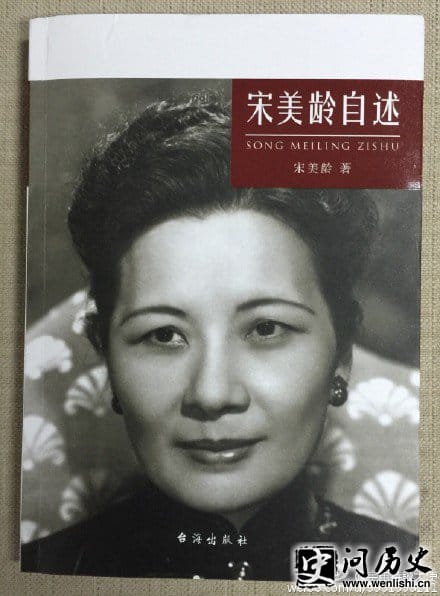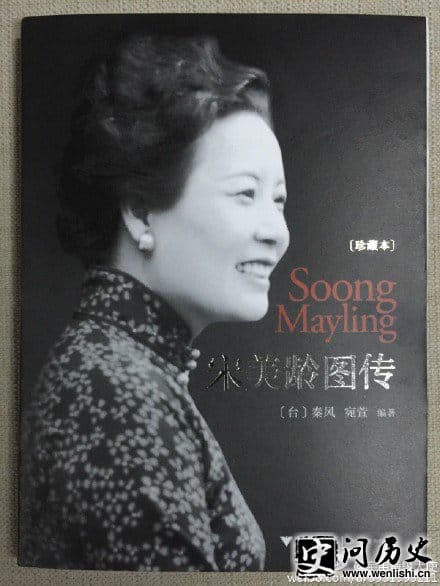议长先生,美国参议院各位议员,各位女士、先生,受到诸位所代表的美国人民热情与真诚的欢迎,令我感动莫名。我事先不知今天要在参议员发表演说,只以为要到此说声”大家好,很高兴见到各位”,并向贵国人民转达敝国百姓的问候之意。不过,在来到此地之前,贵国副总统告诉我,他希望我和各位说几句话。


我并不善于即席演说,事实上根本称不上是演说家,但我不会因此怯场,因为前几天我在海德公园参观过总统图书馆,在那里看见一些东西鼓动了我,让我感觉各位或许不会对我的即席演说要求太多。
各位知道我在那里见到什么吗?我看到了许多,但最让我感兴趣的,莫过于一个放着总统先生(译注:即罗斯福总统)演说草稿的玻璃箱,里头从第一份草稿,第二份草稿,一直到第六份草稿。昨天,我碰巧向总统先生提及此事,我说倭很高兴知道,以他如次知名又公认的演说家,还必须写这么多份草稿。他回答说,有时他一次演说得写12份草稿。因此,今天本人在此发表的即席演说,我确信各位一定会包容。
贵国和敝国之间有着160年悠久历史的情谊,我觉得贵国人民和敝国百姓有许许多多的相似点,而这些相似点正是两国情谊的基础,我也相信并非只有我有这样的感觉。
在此,我想说个小故事,来说明此一信念。
杜利特尔将军和部下一起去轰炸东京,回程时有些美国子弟兵不得不在中国内陆跳伞,其中一人后来告诉我,他被迫从飞机跳伞,踏上中国的土地时,看到当地居民跑向他,他就挥着手,喊出他会说的唯一中国话:”美国。美国”,也就是”美利坚”的意思,(掌声)美国在中国话的意思是”美丽的国家”。这个大男孩说,敝国人民听了都笑起来,拥抱他,像欢迎失散多年的兄弟一般。他还告诉我说,当他看到我们的人民,感觉 他已经回到了家;而那是他第一次来到中国。(掌声)
我来到贵国时是个小女孩,我熟悉贵国人民,我和他们一起生活过。我生命中成长的岁月是和贵国人民一起度过的,我说你们的话,我想的和你们一样,说的也和你们一样。所以今天来到这里,我也感觉我好像回到家了。(掌声)
不过,我相信不只是我回到了家,我觉得,如果中国人民会用你们的语言与你们说话,或者你们能了解我们的语言,他们会告诉你们,根本而言,我们都在为相同的理念奋战(如雷掌声);我们有一致的理想;亦即贵国总统向全世界揭示的”四个自由”:自由的钟声、联合国自由的钟声,和侵略者的丧钟响彻我国辽阔的土地。(掌声)
谨向各位保证,敝国人民深愿亦渴望为实现这些理想和贵国合作,因为我们希望这些理想不会流于空言,而是成为我们的子子孙孙、全人类的真况实境。(掌声)
我们要如何实现这些理想?我想,我可以告诉各位一个我刚想到的小故事。各位知道,中国是一个非常古老的国家。我们有五千年历史。我们被迫从汉口撤退,转入大后方继续抵抗侵略的时候,蒋委员长和我经过一处前线,就在长沙。有一天,我们上衡山,山上有一处有名的遗迹,叫”磨镜台”,是两千多年前的古迹。诸位或许有兴趣听听这古迹的故事。
两千年前,台址近旁有一座古老的佛寺。一名年轻和尚来此修行,他整天盘腿坐禅,双手合一,口中喃喃念着”阿弥陀佛!阿弥陀佛!阿弥陀佛!”他唱念佛号,日复一日,因为他希望成佛。
寺里的主持于是也跟着拿一块砖去磨一块石头,时时刻刻地磨,一天又一天地磨,一周又一周地磨。小和尚有时抬眼瞧瞧老和尚在做什么。主持只是一个劲儿拿砖磨石。终于有一天,小和尚对主持说:”大师,您每天拿这块砖磨石头。到底为什么呢?”主持答道:”我要用这块砖做镜子。”小和尚说:”可砖块是做不成镜子的呀,大师。””没错,”主持说:”就像你成天光念阿弥陀佛,是成不了佛的。”(掌声)
因此,朋友们,我觉得,我们不但必须有理想,不但要昭告我们有理想,我们还必须以行动来落实理想。(掌声)
所以,我要对诸位参议员先生,以及旁听席上的女士和先生们说,没有我们大家的积极协助,我们的领袖无法落实这些理想。诸位和我都必须谨记”磨镜台”的教训。
非常感谢大家。(全场掌声,议员与来宾起立)
The committee appointed by Vice president, preceded by the Secretary of the Senate (Edwin A. Halsey), and the Sergeant at Arms (Wall Doxey), and consisting of Mr. Barkley, Mr. McNary, Mr. Connally, Mr. Capper, And Mrs. Caraway, entered the Chamber at the main door and escorted Mme. Chiang Kai-shek to a seat at the desk immediately in front of the Vice President.
(Mme. Chiang Kai-shek was greeted with prolonged applause, Senators and guests of the Senate rising.)
The VICE PRESIDENT. Senators, distinguished guests, Mme. Chiang Kai-shek, wife of the Generalissimo of the armies of China, will now address you.
[Applause]
ADDRESS BY MME. CHIANG KAI-SHEK
Mr. President, Members of the Senate of the United States, ladies and gentlemen, I am overwhelmed by the warmth and spontaneity of the welcome of the American people, of whom you are the representatives. I did not know that I was to speak to you today at the Senate except to say, “How do you do? I am so very glad to see you,” and to bring the greetings to my people
to the people of America. However, just before coming here, the Vice President told me that he would like to have me say a few words to you.
I am not a very good extemporaneous speaker; in fact, I am no speaker at all; but I am not so very much discouraged, because a few days ago I was at Hyde Park, and went to the President’s library. Something I saw there encouraged me, and made me feel that perhaps you will not expect overmuch of me in speaking to you extemporaneously. What do you think I saw there? I saw
many things. But the one thing which interested me most of all was that in a glass case there was the first draft of tone of the President’s speeches, a second draft, and on and on up to the sixth draft. Yesterday I happened to mention this fact to the President, and told him that I was extremely glad that he had to write so many drafts when he is such a well-known and
acknowledgedly fine speaker. His reply to me was that sometimes he writes 12 drafts of a speech. So, my remarks here today, being extemporaneous, I am sure you will make allowances for me.
The traditional friendship between your country and mine has a history of 160 years. I feel, and I believe that I am now the only one who feels this way, that there are a great many similarities between your people and mine, and that these similarities are the basis of our friendship.
I should like to tell you a little story which will illustrate this belief. When General Doolittle and his men went to bomb Tokyo, on their return some of your boys had to bail out in the interior of China. One of them later told me that he had to mail out of his ship. And that when he landed on Chinese soil and saw the populace running toward him, he just waved his arm and shouted the only Chinese word he knew, “Mei-kuo, Mei-kuo,” which means “America,” [Applause.] Literally translated from the Chinese it means “Beautiful country.” This boy said that our people laughed and almost hugged him, and greeted him like a long lost brother. He further told me that the thought that he had come home when he saw our people; and that was the first time he had ever been to China. [Applause.]
I came to your country as a little girl. I know your people. I have lived with them. I spent the formative years of my life amongst your people. I speak your language, not only the language of your hearts, but also your tongue. So coming here today I feel that I am also coming home. [Applause.]
I believe, however, that it is not only I who am coming home; I feel that if the Chinese people could speak to you in your own tongue, or if you could understand our tongue, they would tell you that basically and fundamentally we are fighting for the same cause [great applause]; that we have identity of ideals’ that the “four freedoms,” which your President proclaimed to
the world, resound throughout our vast land as the gong of freedom, the gong of freedom of the United Nations, and the death knell of the aggressors. [Applause.]
I assure you that our people are willing and eager to cooperate with you in the realization of these ideals, because we want to see to it that they do not echo as empty phrases, but become realities for ourselves, for your children, for our children’s children, and for all mankind. [Applause.]
How are we going to realize these ideals? I think I shall tell you a little story which just came to my mind. As you know, China is a very old nation. We have a history of 5,000 years. When we were obliged to evacuate Hankow and go into the hinterland to carry on and continue our resistance against
aggression, the Generalissimo and I passed one of our fronts, the Changsha front. One day we went in to the Heng-yang Mountains, where there are traces of a famous pavilion called “Rub-the-mirror” pavilion, which perhaps interest you to hear the story of that pavilion.
Two thousand years ago near that spot was an old Buddhist temple. One of the young monks went there , and all day long he sat cross-legged, with his hands clasped before him in and attitude of prayer, and murmured “Amita-Buddha! Amita-Buddha! Amita-Buddha!” He murmured and chanted day after day, because he hoped that he would acquire grace.
The Father Prior of that temple took a piece of brick and rubbed it against a stone hour after hour, day after day, and week after week. The little acolyte, being very young, sometimes cast his eyes around to see what the old Father Prior was doing. The old Father Prior just kept on this work of rubbing the brick against the stone. So one day the young acolyte said to him, “Father Prior, what are you doing day after day rubbing this brick of stone?” The Father Prior replied, “I am trying to make a mirror out of this brick.” The young acolyte said, “But it is impossible to make a mirror out of a brick, Father Prior.” “Yes,” said the Father Prior, “and it is just as impossible for you to acquire grace by doing nothing except
murmur ‘Amita-Buddha’ all day long, day in and day out.” [Applause.]
So my friends, I feel that it is necessary for us not only to have ideals and to proclaim that we have them, it is necessary that we act to implement them. [Applause.] And so to you, gentlemen of the Senate, and to you ladies and gentleman in the galleries, I say that without the active help of all of us, our leaders cannot implement these ideals. It’s up to you and to me to take to heart the lesson of “Rub-the-Mirror” pavilion.
I thank you. [Great applause, Senators and their guests rising.]
Following her address, Mme. Chiang Kai-shek and the distinguished visitors accompanying her and the others guests of the Senate were escorted from the Chamber.
宋美龄之评价:
社会评价
宋美龄是民国政治舞台上的一个关键人物,集美貌、财富、权力、荣誉于一身。宋家三姐妹,有句评语:“大姐爱财,二姐爱国,三妹爱权。”
《生活》周刊 :议员们全被夫人的风采、妩媚和才华吸引了,惊愕了,缭乱了。议员们全体起立,热烈鼓掌达四分钟之久以后,蒋夫人开始演讲,她的主题是:战胜日本比战胜德国更重要,美国应当让她的人民去中国战斗,而不应该在太平洋花费那么多的力量,当她说到,经过五年半的抗战,中国人民相信,“与其忍辱接受失败,不如光荣地冒失败之险,去争取胜利”时,欢呼的掌声达到了高潮。
尼克松《改变亚洲历史的人物》:蒋夫人除了担任她丈夫的议员,还具有其他意义,一般人认为:一位领袖的妻子系因夫而贵,与个人在历史上的表现无关重要。这种看法,不但忽视一位领袖妻子在幕后所担任的任务,且玷污了领袖妻子所具有的特质与性格。我相信蒋夫人的智慧、说服力和道德力量,已使她自己成为一位重要的领袖。蒋夫人是一位文明、美丽、整洁、女性化及坚强的女性。
冰心《我所见到的蒋夫人》:1924年我在美国韦尔斯利女子学院留学时,我的美国老师经常自豪地和我说,本校有一位中国学生,即1917年毕业的宋美龄小姐,她非常聪明、漂亮。在我至今为止见过的妇女中,确实从未有过像夫人那样敏锐聪颖的人。她身材苗条、精神饱满,特别是那双澄清的眼睛非常美丽。宋美龄并不是一个政治的符号,一个令人生厌的达官贵妇,而是一个有血有肉的女人,是一个极有中国传统美德又受西方现代文明熏陶、善于交际的夫人。
历史评价
汪日章:宋美龄有较高的文化教养。她头后梳一个小发髻,旗袍贴身,大衣适体,穿高跟鞋,在甬道上都是轻步走过,我每次碰到,她总是面带微笑,平易近人,每每不觉得有骄矜盛气,和她谈话不觉得拘谨。她言谈委婉适度,声音从不放重,6年中,我从未见闻过她和蒋有过口角。她和别人谈话,总是只让对方可以听清楚就是,从不大声,颐指气使。
美国前国务卿基辛格:一位乱世美人,以女性的非凡情感,影响了大千世界,值得我们永远品味和思考。
西格雷夫:蒋宋美龄成了历史上最著名、最有权势的女人之一。她影晌了两代美国人,美国人多年来一直把她列为世界上最受欢迎最受尊敬的十个妇女之一。她影响了美国领导人做出的决定,并通过这些决定影响全世界整整三十年。
美国将军史迪威:一位聪明、有头脑的女人。持有西方的观点。(我这句话的意思是,中国人在政治和斗争上往往采用拐弯抹角、间接、隐晦的方式,而她能够理解一个外国人对此做出的反应。)她直爽,坚强,精力充沛,喜欢权力,重名誉,喜奉承,对于她的过去满不在乎。
在与外国人打交道时,她从不向西方观点让步。中国人永远是正确的;外国人永远是错误的。文笔引人入胜,但也失于肤浅,对西方的缺陷极尽讽刺,但从来不提中国任何一个微小的缺点。能够随心所欲地施展魅力。她知道该怎么做。对蒋介石有很大影响力,主要是好的影响。有几次帮了大忙。
美国总统布什:“蒋夫人是美国人民的亲密中国朋友,为她的过世感到难过。”
丘吉尔曾对罗斯福说:“这个中国女人可不是弱者!”丘吉尔这个骄傲有名的英国首相,曾不止一次公开表示,宋美龄是他在世上最欣赏的少数女性之一,她的骄矜和妩媚都让人极为心动。
张学良:宋美龄绝顶聪明,是“近代中国找不出第二个来”的人物。西安事变之后,我之所以没有被杀,是因为蒋夫人保护了我。
陈纳德:“宋美龄对于我,永远是一位公主。”
蒋介石:“夫人的能力,抵得上20个陆军师。”
全国政协主席贾庆林于2003年10月24 日发出唁电,高度评价宋美龄女士曾致力于中国人民抗日战争,反对国家分裂,期盼海峡两岸和平统一、中华民族兴盛的历史功绩。
陈谦平:“宋美龄的去世标志着一个时代的结束。”、“宋的一生值得肯定。”
